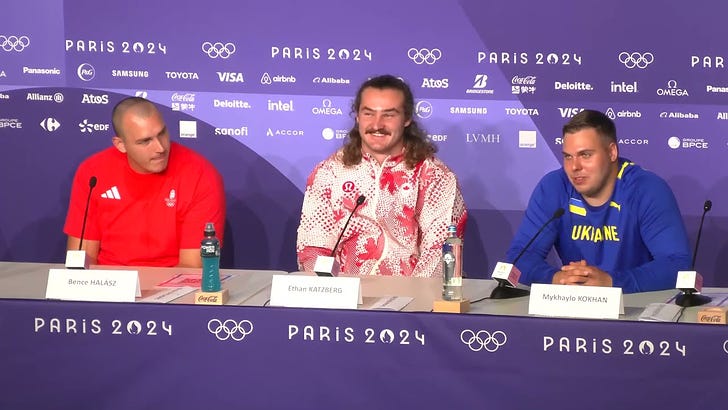When no one asks a gold medalist a question
Why many media do not bother to attend press conferences
The importance of a post-event press conference continues to be less important, even at the Olympic Games. Multiple reasons exist as to why, which I will explore below. Still, for an Olympic gold medalist, the achievement is the culmination of years of hard work and they deserve their moment in the spotlight.
So imagine an athlete’s disappointment when they win an Olympic gold medal and, when no one asks a question, are subjected to interview inquiries from … their competitors. This happened at the Paris Olympic Games following the men’s hammer throw. No one immediately asked questions at the press conference of Canadian Ethan Katzberg’s following his gold medal performance. So Urkanian Mykhaylo Kokhan, the bronze medalist, asked the first question. It was simultaneously charming and sad.
The exchange also threw shade on journalist questions as Kokhan asked the horribly cliched question, “How do you feel, Ethan?” Katzberg responds, somewhat satirically, with “Thank you for the question.”
As someone who was responsible for planning and executing these Olympic post-event press conferences during two Olympic Games, I watched this in horror. In both 1996 and 2002 we had an internal news service, creatively titled the Olympic News Service (ONS), which sent “reporters” to all press conferences and mixed zones to gather athlete quotes and comments. They were free to ask questions. I don’t know whether any similar “reporters” were present at this press conference.
So why would media not attend this? Several reasons exist, but chief among them, as it relates to track and field, is that while this press conference was occurring, it was possible other events were still taking place in the stadium. The travel time to and from the press tribune area to the mixed zone or press conference location might be prohibitive.
As news outlets have slashed travel and personnel budgets, limiting the number of journalists they send to these events, it is hard for a single reporter to be in multiple places at one time.
In addition, the technological advances brought on by Covid, chiefly the Zoom press conference, enable journalists to “attend” a press conference without actually attending. I talked recently to a senior communications executive with a Major League Baseball team who indicated most reporters stay in the press box after a game and bypass attending the press conference, primarily because the team streams the interviews into the press box. As such, as the team undergoes stadium renovations, they are considering reducing the square footage of the interview room.
Another possible reason for the lack of interest in press conferences could be the reality that rarely is anything of substance shared at these events. Athletes and organizations obviously have a multitude of other options to disseminate news and information and to do so in a controlled environment. Consider Noah Lyles disclosing via X (Twitter) that he will not compete further at the 2024 Games. The Olympic Games have offered a master class on athlete presentation and messaging, all without needing to use the media.
I understand the need for a formal press conference as the exchanges become part of the official record of an event such as the Olympic Games. It forces interaction between athletes and media. Future organizers, however, will need to plan for the evolving way in which those two principal stakeholder groups are performing their roles, and manage expectations for how they should be staged.




